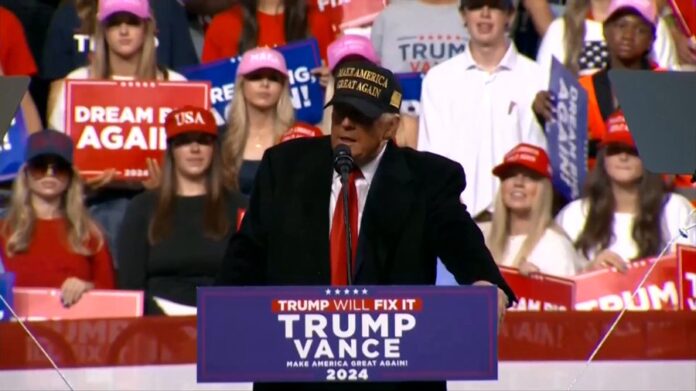Former U.S. President Donald Trump has launched a scathing attack on Episcopal Bishop Mariann Edgar Budde, accusing her of political bias and incompetence after she advocated compassion for immigrants and the LGBT+ community during a national prayer service. Trump, known for his hardline stance on immigration and controversial LGBT+ policies, dismissed Budde as “nasty” and demanded a public apology.
In a post on Truth Social, Trump wrote, “The so-called Bishop who spoke at the National Prayer Service on Tuesday morning was a Radical Left hard line Trump hater. She brought her church into the World of politics in a very ungracious way. She was nasty in tone, and not compelling or smart.”
He further criticized her statements, saying they ignored what he described as a “giant crime wave” caused by illegal migrants in the United States. Trump alleged, without evidence, that many migrants entering the country were released from foreign jails and mental institutions.
A Bishop’s Plea for Mercy
Bishop Budde, speaking at Washington’s National Cathedral, had urged Trump to reconsider his policies, particularly their impact on vulnerable communities. Her remarks came shortly after Trump signed executive orders that tightened immigration rules and rescinded federal recognition for transgender, nonbinary, and intersex individuals.
“There are gay, lesbian, and transgender children in Democratic, Republican, and independent families—some who fear for their lives,” Budde said during her speech. “I ask you to have mercy, Mr. President, on those in our communities whose children fear their parents will be taken away and that you help those who are fleeing war zones and persecution in their own lands to find compassion and welcome here.”
Budde’s words were a stark contrast to Trump’s policies, which have been widely criticized by human rights groups. The latest executive orders include measures to end birthright citizenship, a constitutional guarantee for children born on U.S. soil, and to curtail asylum rights for refugees.
Trump’s Record of Criticism
Trump’s use of the term “nasty” in his response to Budde is notable, as he has previously used the label to demean female critics. The term first gained widespread attention during his 2016 presidential campaign when he referred to then-opponent Hillary Clinton as a “nasty woman.”
The attack on Budde mirrors Trump’s broader strategy of targeting religious figures and institutions that oppose his policies. In 2020, he faced backlash after using tear gas to clear protesters for a photo-op outside a church in Washington, D.C. At the time, Budde publicly condemned the act as a misuse of religious symbolism.
Context of the Debate
The clash underscores the ongoing polarization in the United States over immigration and LGBT+ rights. Trump’s base largely supports his hardline stance, viewing it as necessary to safeguard national security and preserve conservative values. However, critics argue his policies erode fundamental human rights and disproportionately harm marginalized groups.
Budde’s criticism also reflects a growing trend among religious leaders to challenge political authorities on moral grounds. Her advocacy for LGBT+ children and immigrant families aligns with broader movements within the Episcopal Church, which has historically supported social justice causes.
Public Reaction
Reactions to the controversy have been divided. Supporters of Trump praised his forthrightness, with some claiming Budde overstepped her role by delving into political matters. “The church should focus on faith, not politics,” commented a user on social media.
Others defended Budde’s right to speak out, highlighting the moral imperative for religious leaders to advocate for the vulnerable. “Compassion and mercy are at the heart of Christianity,” wrote a prominent activist. “Bishop Budde is doing exactly what a leader of faith should do.”
The Broader Implications
Trump’s criticism of Budde also raises questions about the intersection of faith and politics in America. While religious leaders have traditionally played a role in shaping public discourse, their involvement often sparks controversy when it challenges governmental authority.
For Trump, the episode adds another layer to his contentious relationship with religious institutions. Despite enjoying significant support from evangelical Christians, his policies and rhetoric have alienated more progressive denominations.
Bishop Stands Firm
While Budde has not responded directly to Trump’s remarks, her previous actions suggest she is unlikely to back down. Following the 2020 church photo-op incident, she stated, “We distance ourselves from the incendiary language of this President. The teachings of our church call us to love our neighbors, not demonize them.”

